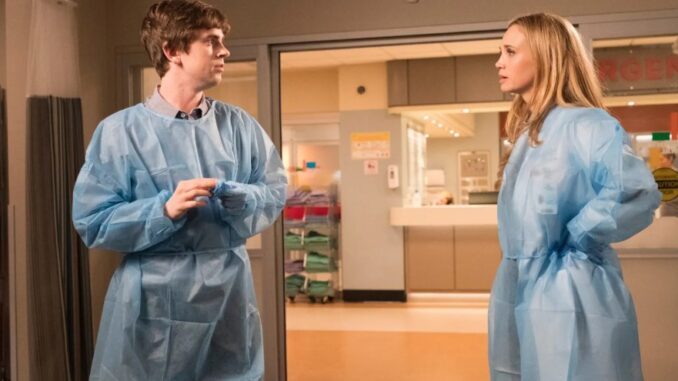
For seven unforgettable seasons, Freddie Highmore has captivated audiences as Dr. Shaun Murphy—the brilliant, autistic surgeon at the heart of The Good Doctor. But behind the polished performance and medically precise dialogue lies a deeper truth: playing Shaun wasn’t just a role, it was an emotional, intellectual, and personal challenge that pushed Highmore to his limits.
In a rare, reflective interview, Highmore peeled back the layers of his process, revealing the intense dedication it took to bring authenticity to a character unlike any other on television. From embodying the traits of someone on the autism spectrum to portraying the emotional complexity of a young man navigating life, death, and love in a hospital, the journey wasn’t always easy—but it was always worth it.
When Highmore first signed on to The Good Doctor, he was no stranger to transformative roles. From Norman Bates in Bates Motel to Charlie in Charlie and the Chocolate Factory, he had already proven his ability to dive deep into complex characters. But Shaun Murphy presented an entirely new kind of challenge.
“This wasn’t a role you could just fake your way through,” Highmore shared. “There was a huge responsibility to portray autism authentically and respectfully.”
To prepare, he worked closely with autism consultants, researchers, and advocacy groups. The goal? To ensure Shaun was not a stereotype, but a fully formed human being—flawed, vulnerable, and brilliant. Every gesture, every inflection of voice, every hesitation in social interaction had to be carefully considered.
“Shaun doesn’t experience the world the way most people do,” Highmore explained. “And I had to rewire how I approached every scene to reflect that.”
For many viewers, especially those on the spectrum or with loved ones who are, Shaun Murphy became a symbol of hope, brilliance, and resilience. Highmore is deeply aware of this impact.
“I’ve received letters from people all over the world,” he said, “parents, siblings, individuals on the spectrum themselves, saying, ‘Thank you for seeing us.’ That means everything.”
But with that appreciation came pressure. “There’s a constant awareness that how you play this character matters. It affects how people see autism. That’s a huge responsibility.”
Highmore wasn’t just acting—he was representing. And that made every scene, every line, an act of advocacy.

One of the lesser-known aspects of Highmore’s experience on The Good Doctor is how emotionally draining it could be. Unlike many procedural dramas, The Good Doctor often explored deeply personal and heartbreaking situations—patients dying, difficult ethical decisions, relationship breakdowns.
“Shaun feels everything very intensely,” Highmore noted. “When a patient dies, he doesn’t have the emotional filter that some of his colleagues do. He internalizes it. And I had to do the same, to stay true to him.”
Sometimes, he said, it took hours after filming a scene just to decompress. “You can’t just switch it off. When Shaun is overwhelmed, I’m overwhelmed. When he’s heartbroken, I feel that heartbreak too.”
One of the central challenges of playing Shaun Murphy is navigating the balance between his extraordinary intelligence and his emotional development. Highmore often found himself walking a tightrope: Shaun is a genius, but not emotionally detached. He struggles with communication, but he’s not without empathy.
“Shaun’s way of expressing emotion is different,” Highmore explained. “He might not cry when someone else would, but that doesn’t mean he’s not devastated.”
The challenge for Highmore was to make those internal emotions visible without exaggeration. A subtle hand tremor, a shift in posture, or a single line delivered with hesitation could speak volumes about what Shaun was feeling.
By season 2, Freddie Highmore wasn’t just the star—he was also a producer and occasional writer for The Good Doctor. That shift gave him more influence over how Shaun’s story was told and how sensitive topics were approached.
“It gave me a chance to protect the integrity of the character,” he said. “It meant I could be involved in bigger creative conversations about representation, storytelling, and tone.”
It also added to his workload. Long days of acting were followed by meetings, script reviews, and creative discussions. “It was exhausting, but incredibly rewarding. I felt like I was helping shape something meaningful.”
Highmore has often said that playing Shaun Murphy changed him—not just as an actor, but as a person.
“Shaun has taught me patience, empathy, and the importance of listening,” he reflected. “I think we could all use a little more of that.”
He also acknowledged how the role helped him grow emotionally. “You can’t play someone like Shaun without reevaluating how you see the world. I’ve become more attuned to nuance, more appreciative of small moments.”
When The Good Doctor ended in 2024, Highmore found it hard to let go. “It’s like losing a friend,” he admitted. “Shaun was a part of my life for seven years. Walking away wasn’t easy.” He shared that the final season was filled with emotional scenes—not just because of the storyline, but because everyone knew it was the end. “There were tears on and off screen,” he recalled.
Even now, months after the finale aired, fans still reach out to thank him for Shaun. “That’s the legacy I’m most proud of,” Highmore said. “That we created something that mattered.” Freddie Highmore may not be a real doctor, but his portrayal of Shaun Murphy will go down as one of the most emotionally rich, culturally significant roles in modern television. With deep respect, careful research, and an open heart, he brought to life a character that inspired millions. In an era of quick fame and surface-level storytelling, Highmore’s dedication to authenticity, advocacy, and emotional truth was the right medicine—and we were lucky to watch it unfold.
